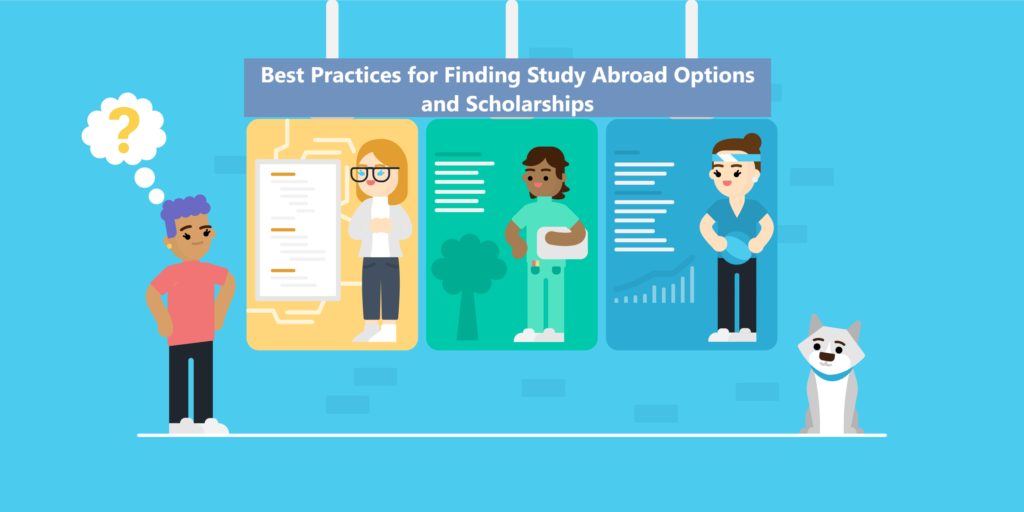Studying abroad is a transformative experience that not only enriches your academic journey but also enhances your personal growth. However, financing this adventure can seem daunting, which is where scholarships and financial aid come in. Fortunately, with the right strategies and a bit of research, you can uncover various options that make your dreams of studying abroad more affordable. Here’s a comprehensive guide on how to efficiently find study abroad programs and secure scholarships, written in a way that makes the process feel approachable and achievable.
1. Identify Your Goals and Interests
Before diving into researching programs and scholarships, take time to clarify your academic and personal goals for studying abroad. Are you looking to enhance language skills, gain specific technical knowledge, or experience a particular culture? Your objectives will help narrow down programs that align with what you want out of the experience. It’s essential to be clear on these from the start, as different countries and institutions may cater to varied academic or personal interests.
**Key Tips:**
– Write down a list of what you’re looking for in a study abroad experience.
– Consider the academic subjects that matter most to you.
– Think about cultural or language preferences, climate, and lifestyle.
The CAS-TWAS Chinese Academy of Sciences Scholarship Guide
2. Research Accredited Study Abroad Programs
Once you have a general idea of your goals, start researching study abroad programs that meet your criteria. Websites like **GoAbroad.com**, **StudyAbroad.com**, and **IIE Passport** offer comprehensive listings of programs worldwide. Some universities also have dedicated offices that manage international studies, offering both in-house programs and partnerships with institutions overseas.
When evaluating programs, ensure they are accredited and recognized both by your home institution and internationally. This will ensure you receive credit for courses completed abroad, making your study experience more valuable in the long run.
**Key Tips:**
– Make a shortlist of programs in the countries you’re interested in.
– Check if your home university has partnerships with foreign institutions.
– Read program reviews to understand the experience of past participants.
3. Begin Scholarship Search Early
Scholarships for studying abroad are competitive, so it’s essential to start early—ideally a year before you plan to go abroad. Scholarships often have specific deadlines and requirements that need adequate time to complete.
Consider both general and program-specific scholarships. Some programs and universities offer exclusive scholarships for international students, and other funding bodies offer aid specifically for study abroad. This early start will also give you time to gather recommendation letters, write compelling personal statements, and complete application requirements.
**Key Tips:**
– Bookmark scholarship deadlines in your calendar.
– Allow time for obtaining letters of recommendation.
– Look into scholarships available at both your home and host institutions.
Top Academic Job Websites for University Positions Worldwide
4. Explore Government and Nonprofit Scholarships
Many governments offer scholarships to encourage cross-cultural exchange. For example, the **Fulbright Program** in the U.S., **Chevening Scholarships** in the U.K., and the **DAAD Scholarship** in Germany are well-known for supporting international students. Additionally, many nonprofits and foundations provide scholarships for students going abroad, including the **Rotary International** and **The Fund for Education Abroad**.
If you’re unsure where to begin, start by exploring these well-known options. They often cover tuition, accommodation, and sometimes even travel expenses, making them ideal for students in need of substantial financial support.
**Key Tips:**
– Research the eligibility requirements and funding amounts of government scholarships.
– Look for niche scholarships targeting specific demographics, fields, or regions.
– Don’t hesitate to apply for smaller scholarships; they add up!
5. Contact the Financial Aid Office
Your university’s financial aid office is a valuable resource, even if you are studying abroad. Many institutions allow federal or institutional financial aid to transfer to study abroad programs. The financial aid advisors can provide information on which types of aid can be applied to international studies and help guide you through the process.
**Key Tips:**
– Ask about any study abroad-specific grants or loans.
– Inquire if your current scholarships or grants apply to your study abroad program.
– Verify if the credits you earn abroad will count toward your degree requirements.
Scholarships and Jobs for International Students in Germany
6. Utilize Scholarship Databases and Tools
Scholarship databases are incredibly helpful for finding a variety of funding opportunities in one place. Websites like Unisearch allow you to search based on criteria like academic interests, location, and eligibility. These sites frequently update, so be sure to check back regularly for new opportunities.
Another excellent resource is **Niche.com**, where scholarships are filtered by student profile and demographic, helping you find niche scholarships that may have less competition.
**Key Tips:**
– Regularly check databases as new scholarships become available.
– Set up alerts to notify you about new scholarships that match your profile.
– Tailor your search by specific fields, countries, or demographic categories.
7. Tap Into Alumni Networks and Study Abroad Forums
Alumni from your university or former study abroad students are invaluable sources of information. Many people who have gone through the process are happy to share insights and tips that aren’t available online, including information on scholarships they may have used. Look into alumni associations or online communities related to your university, or even social media groups dedicated to study abroad experiences.
**Key Tips:**
– Contact your university’s alumni office for a list of former students who have studied abroad.
– Join online forums like Reddit’s r/studyabroad or Facebook groups.
– Ask alumni for honest insights about program costs, hidden expenses, and scholarship options.
Merit and Need-based top Universities Scholarships
8. Tailor Your Applications Carefully
When it’s time to apply, put thought into each application to increase your chances of success. Scholarship committees receive hundreds of applications, so a personalized, well-crafted essay can set yours apart. Describe your academic and career aspirations, and explain how studying abroad will help you achieve them. Show genuine enthusiasm and a clear understanding of why that particular program or country is the best fit for you.
**Key Tips:**
– Avoid generic language; tailor each essay to the specific scholarship.
– Provide concrete examples of how the scholarship will impact your future.
– Proofread meticulously to avoid grammar or spelling errors.
9. Consider Exchange Programs
If you’re looking for a more cost-effective way to study abroad, consider exchange programs that offer direct student swaps between universities. These programs often allow you to pay your home institution’s tuition rates, which can be significantly cheaper than foreign tuition fees. They may also provide unique scholarships or grants specifically for exchange students.
**Key Tips:**
– Check with your university for available exchange programs.
– Research the academic and cultural benefits of partner universities.
– Inquire if there are any exchange-specific scholarships.
Canada for international students! Scope and Opportunities
10. Be Mindful of Cost of Living Differences
Beyond tuition, remember to factor in the cost of living in the country you choose. Scholarships may not cover all expenses, and budgeting wisely can make your experience abroad much smoother. Some countries are more expensive than others, especially for students coming from regions with a lower cost of living. Additionally, working while studying might be an option in certain countries, so check local policies regarding part-time student employment.
**Key Tips:**
– Compare the cost of living across different study abroad destinations.
– Plan for additional expenses like travel, insurance, and course materials.
– Budget carefully and consider maintaining a financial cushion for emergencies.
Conclusion
Studying abroad is a fantastic opportunity to broaden your horizons, gain global insights, and build memories that last a lifetime. By starting early, doing thorough research, and using available resources, you can find the right program and secure scholarships to support your journey. Remember, persistence is key; applying for multiple scholarships may increase your chances, and careful planning will ensure that your study abroad experience is both affordable and rewarding.


